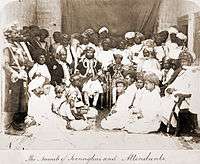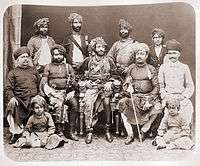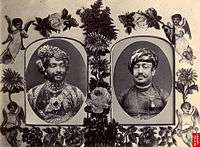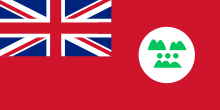Junagadh State
| Junagadh State જુનાગઢ રિયાસત | ||||||
| Princely State of British India | ||||||
| ||||||
| ||||||
| History | ||||||
| • | Established | 1807 | ||||
| • | Indian integration of Junagadh | 1948 | ||||
| Area | ||||||
| • | 1921 | 8,643 km2 (3,337 sq mi) | ||||
| Population | ||||||
| • | 1921 | 465,493 | ||||
| Density | 53.9 /km2 (139.5 /sq mi) | |||||
| Today part of | Gujarat, India | |||||
| | ||||||
Junagadh was a princely state in Gujarat ruled by a Muslim Babi Dynasty in British India, until its integration into the Indian Union in 1948.
History
Muhammad Sher Khan Babi was the founder of the Babi Dynasty of Junagadh State in 1654. His descendants, the Babi Nawabs of Junagadh, conquered large territories in southern Saurashtra.
However, during the collapse of the Mughal Empire, the Babis became involved in a struggle with the Gaekwad dynasty of the Maratha Empire over control of Gujarat. Mohammad Sher Khan Babi declared independence from the Mughal governor of Gujarat subah, and founded the state of Junagadh in 1730. This allowed the Babi to retain sovereignty of Junagadh and other princely states. Junagadh was then a tributary to the Maratha Empire,[1] until it came under British suzerainty in 1807, following the Second Anglo-Maratha War.
In 1807, the Junagadh State became a British protectorate and The East India Company took control of the state. By 1818, the Saurashtra area, along with other princely states of Kathiawar, were separately administrated under the Kathiawar Agency by British India.
In 1947, upon the independence and partition of India, the last Babi dynasty ruler of the state, Mohammad Mahabat Khanji III, decided to merge Junagadh into the newly formed Pakistan. However, the Hindu citizens, who formed the majority of the population, revolted, leading to several events and also a plebiscite, resulting in the integration of Junagadh into India.[2]
Rulers
The Nawabs of Junagadh belonged to Pathan Babi or Babai (Pashtun tribe). They were granted a 13 gun salute by the British authorities:[3]
- 1730–1758 : Mohammad Bahadur Khanji or Mohammad Sher Khan Babi [4]
- 1758–1774 : Mohammad Mahabat Khanji I
- 1774–1811 : Mohammad Hamid Khanji I
- 1811–1840 : Mohammad Bahadur Khanji I
- 1840–1851 : Mohammad Hamid Khanji II
- 1851–1882 : Mohammad Mahabat Khanji II
- 1882–1892 : Mohammad Bahadur Khanji II
- 1892–1911 : Mohammad Rasul Khanji
- 1911–1948 : Mohammad Mahabat Khanji III (last de facto ruler)
 Junagadh Nawabs and state officials, 19th century |
 Mohammad Mahabat Khanji II, the Nawab of Junagarh, with young, Mohammad Bahadur Khanji III, 1870s |
 Bahadur Khanji II (r. 1882–1892), Nawab of Junagadh, and state officials, 1880s |
 Mohammad Rasul Khanji, Nawab of Junagadh, Bahaduddinbhai Hasainbhai, Wazier, Junagadh, 1890s |
One of the Junagadh family resides in Ahmedabad India—descendants of the family of Valid Ahad Shehzada Shri Sherzaman Khanji Rasul Khanji Babi Bahadur, who was the elder brother of last ruling Nawab Sahab Shri HH Nawab Sahab Shri Mahabat Khanji III Rasul khanji. The present head of the family, Darbar Sahab Shri Shamsher Ali Khanji Hayat Khanji Babi Sahab of Devgam, itself an offshoot of Junagadh state, is the great-grandson of Valid Ahad Shehzada Sahab. His representative is his eldest nephew Sahibzada Muzammil Hayat Khanji Anis Mohammad Khanji Babi.
Integration into India
In 1947, Shah Nawaz Bhutto joined the council of ministers of Nawab Muhammad Mahabat Khan III, and in May became his dewan or prime minister.
With the independence of India in 1947, the princely states were left by the British to decide whether to accede to one of the newly independent states of India or Pakistan or to remain outside them. The Constitutional Advisor to the Nawab, Nabi Baksh, indicated to Lord Mountbatten that he was recommending that Junagadh should join India. However, upon the advice of Dewan Bhutto, on 15 August 1947, the Nawab announced that Junagadh had acceded to Pakistan. On 13 September, the Government of Pakistan accepted the accession.[5]
The Hindu majority of Junagadh revolted, leading to the near-collapse of the state government, and a December plebiscite which overwhelmingly called for the integration of Junagadh into India.[2] Nawab Muhammad Mahabat Khan III of Junagadh (erstwhile Babi nawab dynasty of Junagadh) left to live in Sindh, Pakistan.[6]
See also
- Annexation of Junagadh
- Manavadar State
- V. P. Menon
- Political integration of India
- Pathans of Gujarat
References
- ↑ Georg Pfeffer and Deepak Kumar Behera, Contemporary Society: Concept of tribal society, p. 198
- 1 2 Gandhi, Rajmohan (1991). Patel: A Life. India: Navajivan. p. 292.
- ↑ Soszynski, Henry. "JUNAGADH".
- ↑ Nawabs of Junagadh British Library.
- ↑ Menon, V. P. (1956). The Story of Integration of the Indian States (PDF). Orient Longman. pp. 85–87.
- ↑ http://www.junagadhmunicipal.org/history.php
External links
| Wikimedia Commons has media related to Junagadh State. |
Coordinates: 21°31′N 70°28′E / 21.52°N 70.47°E

